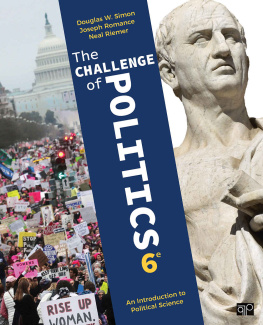POWER, POLITICS, AND
SOCIETY: AN INTRODUCTION
TO POLITICAL SOCIOLOGY
Betty A. Dobratz
Iowa State University
Lisa K. Waldner
University of St. Thomas
Timothy Buzzell
Baker University
First published 2012 by Pearson Education, Inc.
Published 2016 by Routledge
2 Park Square, Milton Park, Abingdon, Oxon OX14 4RN
711 Third Avenue, New York, NY 10017, USA
Routledge is an imprint of the Taylor & Francis Group, an informa business
Copyright 2012 Taylor & Francis. All rights reserved.
All rights reserved. No part of this book may be reprinted or reproduced or utilised in any form or by any electronic, mechanical, or other means, now known or hereafter invented, including photocopying and recording, or in any information storage or retrieval system, without permission in writing from the publishers.
Notice:
Product or corporate names may be trademarks or registered trademarks, and are used only for identification and explanation without intent to infringe.
Credits appear on , which constitutes an extension of the copyright page.
ISBN: 9780205486298 (pbk)
Cover Designer: Karen Salzbach
Library of Congress Cataloging-in-Publication Data
Dobratz, Betty A.
Power, politics, and society: an introduction to political sociology / Betty A. Dobratz, Lisa K.
Waldner, Timothy Buzzell.
p. cm.
Includes bibliographical references and index.
ISBN-13: 978-0-205-48629-8 (alk. paper)
ISBN-10: 0-205-48629-0 (alk. paper)
1. Political sociology. I. Waldner, Lisa K. II. Buzzell, Tim. III. Title.
JA76.D598 2012
306.2dc22
2010052422
Please visit the companion website at www.routledge.com/9780205486298
CONTENTS
TABLES AND FIGURES
Do you know that ancient Chinese proverb you get when you open a fortune cookie? May you live in interesting times. Thats not deep political sociology. But, the profound simplicity to capture our sociological moment is summarized in that phrase in so many ways. We live in one of the most fascinating periods in political and social history. Terrorism has pushed the global political landscape into different realms. In 2008 Americans elected the first African-American president. Today, we find ourselves struggling with economic hardships tipped into tensions created by deregulation of banking, ideological struggles that characterize the first decade of the twenty-first century, and all the economic and political uncertainty that comes with globalization. There is perhaps no better time to be a political sociologist.
While political sociology has often been described as divergent, abstract, and fragmented, it continues to be an important subfield in sociology because a number of themes consistently explored by political sociologists are particularly relevant to the development of a sociological perspective. We believe undergraduate sociology students should be exposed to these themes, so we have written this text and its supplementary materials with three central goals. First, introduce undergraduate students to core concepts and research in political sociology. Second, highlight how sociologists have organized the study of politics into conceptual frameworks, and how each of these frameworks fosters a sociological perspective on power and politics in society. This includes discussing how these frameworks can be applied to understanding current issues and other real-life aspects of politics. Third, connect with students by engaging them in activities where they complete their own applications of theory, hypothesis testing, and forms of inquiry. We hope that instructors find the Web-based data applications and other supplementary material useful toward meeting this goal.
The plan of the book unfolds around these three goals. We begin with a discussion of the central concept in political sociology: power. we integrate the study of power and politics to align with the cultural turn in the field of sociology more generally. Here we examine the more traditional features of political culture, such as political values and ideology and the study of how these values are acquired. The chapter also presents more recent theorizing which mixes institutions and culture, and suggests that the two must go hand in hand in order to understand the nature of politics.
As Mills suggested, private concerns connect to public issues. In illustrates how the political process impacts the institutions of education, including No Child Left Behind legislation, and marriage, especially the controversial issue of same-sex marriage (still legal in only a few states). This chapter would not be complete without considering the politics surrounding medical care and the difficulties of passing major health care reform. The concerns of civil liberties and national security are addressed as well, and we end the chapter pointing out that the state is a racial state and clearly influences our immigration policy.
In we move the analysis into a fairly comprehensive discussion of the nature of political participation. This area of political sociology is extensive and provides great insights into the ways in which individuals, political groups, the state, and other elements of the public sphere all come together in the contest for power. The typologies of political participation presented in this chapter are good examples of the many ways in which political sociologists have examined the question, what power do individuals have to shape the political and social events of the day? The chapters that follow look at specific kinds of political participation: voting, movements, and terrorism.
In we analyze voting, which is likely the most direct way for a majority of individuals in a democracy to influence politics. Elections perform numerous roles for individuals and society as candidates are selected for political office. The United States has one of the lower turnout rates for elections and some of the reasons for this may be associated with our electoral system. We look at a number of social, demographic, economic, and political factors to explain why people vote for the candidates they do. The 2008 election is analyzed including a discussion of the possible meanings of the election of a biracial president. Finally we consider the rise of the Tea Party Movement and examine the results of the 2010 election.
In we discuss the importance of social movements that use both institutionalized and noninstitutionalized political activities to achieve their goals. Old and new social movements are compared and contrasted, noting that some movements are more likely to focus on class issues whereas others are more concerned with identity politics. We identify how important concepts such as collective identity, framing, and emotions are for the study of movements. In detail we examine the life cycle of social movements, including emergence, mobilization, political opportunity structures, outcomes, and decline. After discussing why social movements matter, we conclude by arguing that social movements should be viewed as a key part of political sociology.
Political violence including war, genocide, and terrorism is the focus of . We begin by considering the political uses of hate that can result in genocide and other forms of state-sanctioned violence against state citizens. A variety of sociological causes of terrorism are considered as well as state responses, including the threat to democracy not only posed by terrorists themselves but by democratic states that attempt to keep citizens safe, as security measures are often in conflict with basic civil liberties.
Next page










